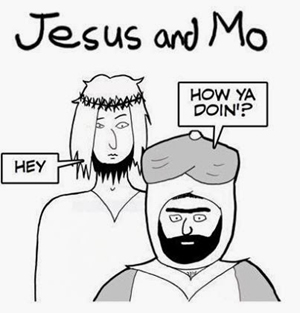
This article is cross-posted from Kenan Malik's blog Pandaemonium
‘Thank you @Channel4News you just pushed us liberal Muslims further into a ditch’. So tweeted Maajid Nawaz, prospective Liberal Democratic parliamentary candidate for Hampstead and Kilburn, last night. He had every right to be incandescent. Channel 4 News had just held a debate about the Jesus and Mo cartoons and about the campaign to deselect Nawaz for tweeting one of the cartoons, not finding them offensive. Channel 4 decided that they were offensive and could not be shown. It would have been bad enough had the channel decided simply not to show the cartoon. What it did was worse. It showed the cartoon – but blanked out Muhammad’s face (and only Muhammad’s face). In the context of a debate about whether Nawaz had been right to tweet the cartoon in the first place, or whether his critics were right to hound him for ‘offending’ Muslims, it was an extraordinary decision. The broadcaster had effectively taken sides in the debate – and taken the side of the reactionaries against the liberal.
There has been something quite surreal about the whole controversy over Maajid Nawaz and his refusal to be offended by the Jesus and Mo cartoons. A one-time Islamist turned anti-extremist campaigner, Nawaz is a founder of the Quilliam Foundation, dedicated to combating Islamic extremism, and Liberal Democrat PPC for Hampstead and Kilburn. Two weeks ago he took part in the BBC’s Big Questions programme, in which there was a debate about religious offence. The programme discussed an incident at the LSE Fresher’s Fair when two students from the Atheist, Secularist and Humanist Society were forced to cover up the ‘Jesus and Mo’ t-shirts they had been wearing. (The LSE later apologized to the students for its heavy-handed reaction.) For those who don’t know, Jesus and Mo is a cartoon strip featuring Jesus and Muhammad sharing a house and discussing religion, philosophy and politics, with each other and sometimes with an atheist barmaid down the pub. It is clever, witty and, of course, irreverent
Nawaz insisted on the show that he found nothing offensive about the cartoons. ‘I’m sure God is greater than to feel threatened by it’, he observed. Astounded by the fact that BBC had refused to show the cartoons on air, Nawaz later tweeted an image of one to once again make the point that there was nothing offensive about it. At which point all hell broke lose.
Fellow Liberal Democrat Mohammed Shafiq organized an international campaign to hound Nawaz for causing ‘immense offence and disrespect to the religious beliefs and sentiments’ of Muslims. A petition was set up calling for Nawaz’s deselection. The activist, ‘community leader’ and prolific tweeter Mohammed Ansar joined the campaign against Nawaz, urging people to sign the petition (though absurdly he also insists that he neither finds the cartoons offensive nor necessarily wants Nawaz sacked; that apparently is ‘nuance’). Nawaz has received a torrent of abuse on social media and a sackful of death threats.
There is something truly bizarre (and yet in keeping with the zeitgeist of our age) that someone should become the focus of death threats and an international campaign of vilification for suggesting that an inoffensive cartoon was, well, inoffensive.
From the Rushdie affair to the controversy over the Danish cartoons, from the forcing offstage of Gurpreet Kaur Bhatti’s play Behzti to the attempt this week by members of Northern Ireland’s Democratic Unionist Party to shut down the Reduced Shakespeare Company’s production of The Bible: The Complete Word Of God (a decision thankfully later reversed), reactionaries have often used campaigns against ‘offence’ as a political weapon with which to harass opponents and as a means of bolstering their community support. The anti-Nawaz campaign is no different. Mohammed Shafiq and Mohammed Ansar both have had public spats with Nawaz, and both are cynically exploiting the claim of ‘offensiveness’ to reclaim political kudos.
What gives the reactionaries the room to operate and to flex their muscles is, however, the pusillanimity of many so-called liberals, their unwillingness to stand up for basic liberal principles, their fear of causing offence, their reluctance to call so-called community leaders to account. This is why Channel 4’s stance was so obnoxious. The broadcaster’s role is not to take sides in these debates. It is to tease out the arguments, and to stand by basic journalistic principles, including the principle of free speech. What Channel 4 did was the very opposite. It abandoned its journalistic principles, refused to stand up for free speech and took sides with the reactionaries. The Liberal Democrats themselves have been equally spineless. Though some have publicly defended Nawaz, leading figures have been noticeably reluctant to stick their necks out. It took almost a week before party leader Nick Clegg put out a statement, and then a relatively bland one, urging both sides to play nicely.
Such backsliding liberals need reminding of some basic points about liberalism, free speech and the giving of offence:
1 There is a right to free speech. There is no right not to be offended
People have the right to say what they wish, short of inciting violence, however offensive others may find it. Others have the right not to listen or to watch. Nobody has the right to be listened to. And nobody has the right not to be offended.
2 It is minority communities who most suffer from censorship
Many people argue that while free speech may be a good, it must necessarily be less free in a plural society. For diverse societies to function and to be fair, so the argument runs, we need to show respect not just for individuals but also for the cultures and beliefs in which those individuals are embedded and which helps give them a sense of identity and being. This requires that we police public discourse about those cultures and beliefs, both to minimise friction between antagonistic groups and to protect the dignity of those individuals embedded in them. As the sociologist Tariq Modood has put it, that ‘If people are to occupy the same political space without conflict, they mutually have to limit the extent to which they subject each others’ fundamental beliefs to criticism.’
In fact, it is precisely because we do live in a plural society that we need the fullest extension possible of free speech. In such a society, it is both inevitable and important that people offend the sensibilities of others. Inevitable, because where different beliefs are deeply held, clashes are unavoidable. Almost by definition such clashes express what it is to live in a diverse society. And so they should be openly resolved than suppressed in the name of ‘respect’ or ‘tolerance’.
But more than this: the giving of offence is not just inevitable, it is also important. Any kind of social change or social progress means offending some deeply held sensibilities. Or to put it another way: ‘You can’t say that!’ is all too often the response of those in power to having their power challenged. To accept that certain things cannot be said is to accept that certain forms of power cannot be challenged.
The notion of giving offence suggests that certain beliefs are so important or valuable to certain people that they should be put beyond the possibility of being insulted, or caricatured or even questioned. The importance of the principle of free speech is precisely that it provides a permanent challenge to the idea that some questions are beyond contention, and hence acts as a permanent challenge to authority. This is why free speech is essential not simply to the practice of democracy, but to the aspirations of those groups who may have been failed by the formal democratic processes; to those whose voices may have been silenced by racism, for instance. The real value of free speech, in other words, is not to those who possess power, but to those who want to challenge them. And the real value of censorship is to those who do not wish their authority to be challenged. Once we give up on the right to offend in the name of ‘tolerance’ or ‘respect’, we constrain our ability to challenge those in power, and therefore to challenge injustice.
3 What is often called offence to a community is actually a debate within that community
People often talk about ‘offence to a community’. More often than not what they actually mean is ‘debate within a community’. Some Muslims find the Jesus and Mo cartoons offensive. Other Muslims – Maajid Nawaz among them – do not. Some found The Satanic Verses offensive. Others did not. Some Sikhs found Behzti offensive. Others did not. It is because what is often called ‘offence to a community’ is in reality a ‘debate within a community’ that so many of the flashpoints over offensiveness have been over works produced by minority artists – Salman Rushdie, Gurpreet Kaur Bhatti, Hanif Kuresihi, Monica Ali, Sooreh Hera, Taslima Nasrin, MF Hussain, and so on.
The trouble is, that every time one of these controversies comes along only the conservative, reactionary figures are seen as the authentic voices of minority communities. So the critics of The Satanic Verses were seen as authentic Muslims, but not Salman Rushdie. The campaigners against Behzti were seen as authentic Sikhs, but not Gurpreet Kaur Bhatti. And so on. Salman Rushdie and Gurpreet Kaur Bhatti (and Maajid Nawaz) are regarded as too Westernized, secular or progressive to be truly of their community. To be a proper Muslim, in other words, is to be offended by the Jesus and Mo cartoons or The Satanic Verses, to be a proper Sikh is to be offended by Behzti. The argument that offensive talk should be restrained is, then, both rooted in a stereotype of what it is to be an authentic Muslim or a Sikh and helps reinforce that stereotype. It plays into the racist view of minority communities. That is why it is important to challenge the campaign against Maajid Nawaz not simply as free speech campaigners but as anti-racist campaigners too.
4 There can be no freedom of religion without the freedom to offend
Freedom of worship is another form of freedom of expression – the freedom to believe as one likes about the divine and to assemble and enact rituals with respect to those beliefs. You cannot protect freedom of worship without protecting freedom of expression. Take, for instance, the Dutch populist politician Geert Wilders’ attempt to outlaw the Qur’an in Holland because it ‘promotes hatred’. Or the attempt by Transport for London to ban a Christian anti-gay poster because it is ‘offensive to gays’. Both Wilders and TfL are wrong, just as Channel 4 is wrong. Believers have as much right to offend liberal sensibilities as liberals have the right to offend religious ones. Freedom of speech requires that everyone has the right to cause offence. So does freedom of religion.

